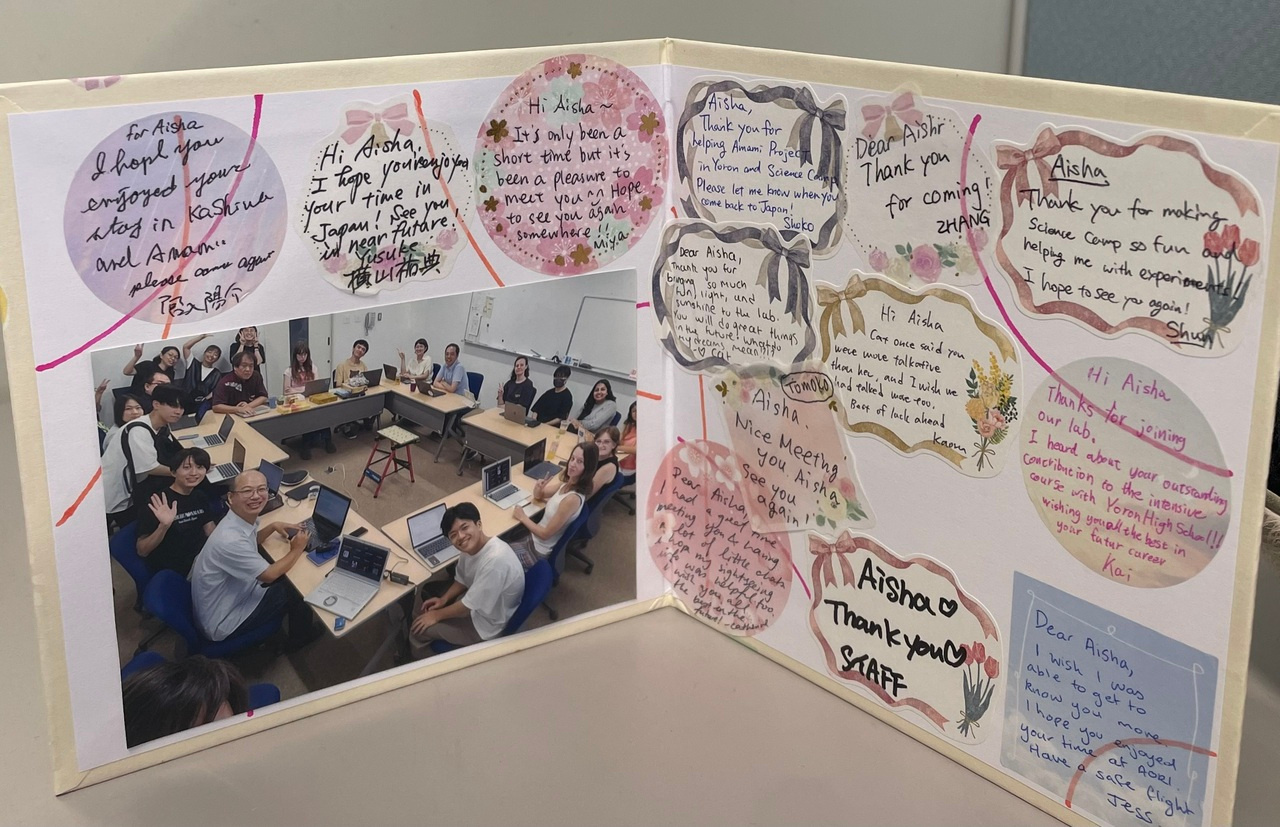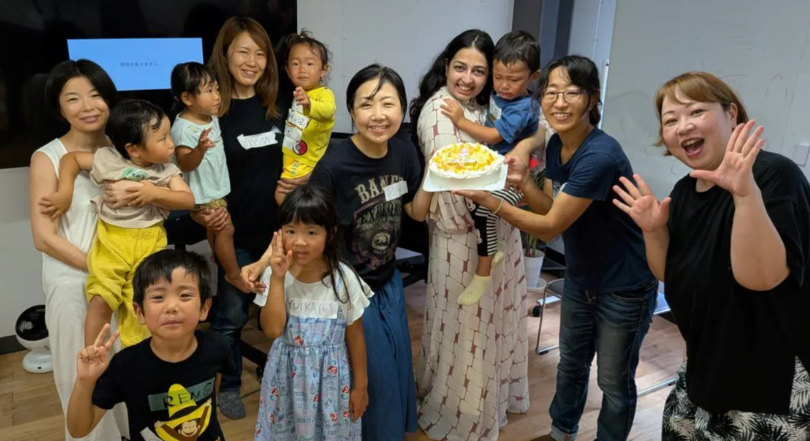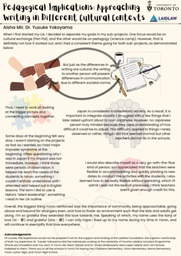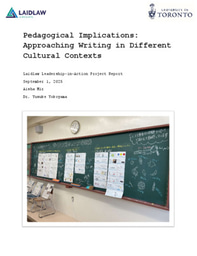LiA - Week 6 Log

Ha… week 6, the culmination and a point of acknowledgement of the continuity of some projects (like the Model UN and Pen Pal projects) when I return to Canada.
Just to give a snippet of my LiA reflection, this week I had lost my credit card, lost my phone, was caught in a typhoon, escaped on a ferry to another island to fly out, and I flew out phone-less and landed in Tokyo at 12:00AM, at a completely dark Narita Airport.
But, it made me realize the things I would do for these kids, as I made it to the science camp, and was running on a few hours of sleep.
What went well?
The students presented their work for the science camp and were working on that for the three days. I didn’t realize how intensive it would be until I witnessed them do all their data analysis of the samples within two days. And then they had to make the rest of their slides (more of the methods, results, and discussion).
I’m glad that a lot of my advice for the students’ feedback for the slides carried over. This week was really fun, really intensive, but really rewarding. On the second day, we were making graphs and I cannot stress how much I despise Google Spreadsheets for making graphs. There are much more efficient softwares that can conduct statistical tests which would have made the students’ lives easier.
After the science camp, I ended up creating a report about the feedback for science camp to make it better, and my suggestion overall was rather than just focusing on the 3 days on the campus, the students should also be learning scientific methodology and presentation creation throughout the semester. I feel like there’s a lot of potential to teach students all the different aspects of research, from writing to analyzing the data, that an entire curriculum should be dedicated leading up to the science camp. I proposed a 12-week curriculum with assignments, workshops, timelines to do sample collection, and timelines to create the presentations.
One thing that would be a huge marker of success of the report in particular is if I would be able to apply this next year and be able to contribute to some capacity next year, even if virtually. I really want the students to get the most out of this experience. The vice-principal and English teacher of Yoron High School were particularly impressed with how the science camp not only helped them with research skills but also their English.
In the end, I left on great terms with all the school teachers and students and was really happy with the outcome of the science camp. There were certainly a lot of nights where I ran on very little sleep to help the students, and they barely slept either, but it worked out!
What could have gone differently?
I think there are so many things that could have gone differently. One thing in particular is that I wish I had known how time consuming the analysis during the science camp would be so I could have pushed for more progress on the methods by adding slides on the types of analysis that would be done in the lab as well as knowing how their data needed to be presented.
More specifically, I wanted to give more workshops prior to the science camp occurring, because I feel like there was a gap between the feedback being given to the students and what they had put in terms of the rationale behind framing research in a certain way for presentations. For example, citing authors was completely new to them, and it felt really rushed to have only given them two workshops on citation practices and on what to cite, especially since it was entirely new to them.
Despite that, they did a really wonderful job! I wrote feedback reports for the group, and was really proud of how far they came from initially.
I did give feedback of what could have gone differently when I wrote my report about the science camp, and there is a lot that I wish I was proactive in beforehand, but I learned a lot and besides, that’s the beautiful part about reflecting upon experiences.
What did I learn about myself when working with others?
I think it’s a bit hard for me to catch onto when a student is feigning understanding and when they actually understand. I realized at the end of this trip that the students would act like they understood what I said in English, but then would go into an awkward kind of silence after that, still being confused. So, I’ve had to use ChatGPT a little more than I liked (who knew the AI enthusiast would ever speak of ChatGPT in such a way?) but as a result, I understand clearly what the students want and they understand clearly what I’m trying to communicate with them. I would consider myself emotionally intelligent to some degree, but this experience really had me questioning my emotional intelligence when I’d be unable to tell if a student understood what I explained or not. I really want to improve upon this trait. I suppose in the past, my exposure to understanding where I belonged and didn’t belong in conversations was implied by a tone someone would take with me, or facial cues that I feel are more visible when I speak with others in Canada, whereas in Japan, people are very indirect with expressing something so as to not hurt your feelings.
What did I learn about leadership?
Sometimes when someone is struggling to do a task, I usually just tell them that I’ll do it. So when it came to making the graphs and the students had a hard time understanding how to map it out on Google Spreadsheets, I said I would use a different software and do the analysis and explain how to interpret the graphs later. Of course, I didn’t mean to do this by implying they were unfit for the task; but rather, there was such a short timeline with the students’ presentations being tomorrow, that I didn’t want them to be stressed out more by having more work to do.
But then I realized that they needed to learn by themselves and I was robbing them of an opportunity. Part of helping others in leadership thus, is allowing them to struggle in order to learn. In previous club positions, if I had a leadership role and someone was not responding or was busy with a task, instead of giving an extension, I just did the work myself. But the inability to delegate tasks and communicate about that delegation is not good when working in teams.
Conclusion
It’s been a really fun, sometimes stressful 6 weeks, and the experience transformed me beyond words. My most important takeaway was that leading with love is the most important trait. For me, the word I was looking for in Arabic was fitrah, a concept deeply rooted in Islam. Now, when you do a Google search for this word, it will give you the surface level meaning about how people have an inclination towards God, but that’s not what I’m talking about. Fitrah has many aspects that discuss human nature and its innateness, and a huge part of this is explaining that humans in their disposition have a natural tendency to incline towards compassion and moral instinct. This innate disposition is then shaped based on life experiences, but every human is believed to have this to a degree. I kept thinking the word was fitr for some reason, and when I looked into fitr, I found it was a root word that led to many meanings, and fitrah was the first meaning among them. Well, at least my mystery is solved.
Thank you to everyone who mentored and helped me on this journey. I am incredibly indebted to you all.
All my love,
Aisha






Please sign in
If you are a registered user on Laidlaw Scholars Network, please sign in